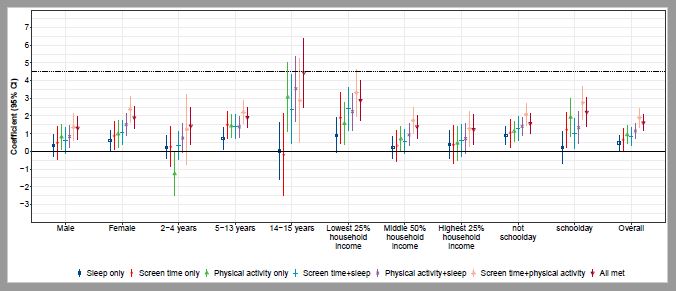Association between 24-hour movement behaviors and health-related quality of life in children
Click above for detailed image
A recent article on Association between 24-hour movement behaviours and health-related quality of life in children by HEU PhD candidate, Xiuqin Xiong, together with A/Prof Kim Dalziel, Dr Natalie Carvalho, Dr Li Huang and colleague from Monash University has been published in Quality of Life Research.
The latest National Child Health Poll in Australia showed that the number one health concern for parents in 2021 is ‘excessive screen time’. And ‘not enough exercise’ was also one of the top ten concerns. In this newly published study, Xiuqin and colleagues explored the relationship between meeting the integrated 24-hour movement guidelines including recreational screen use, physical activity and sleep, and health-related quality of life (HRQOL) by age group and socio-economic status. They found a positive association between adherence to 24-hour movement guidelines and HRQOL using a nationally represented sample of nearly 9,000 children aged 2-15 years in Australia. Meeting physical activity guidelines alone contributed more to HRQOL than meeting sleep and recreational screen time guidelines alone respectively. The HRQOL improvement was the highest for children aged 14-15 years and those from lower income families. This has important implications for policy makers seeking to promote child health with modifiable behaviors.
Xiuqin is a second year PhD candidate at Health Economic Unit, with A/Prof Kim Dalziel, Dr Natalie Carvalho, Dr Li Huang. Her PhD topic is Measurement and application of health-related quality of life in Australian children.
